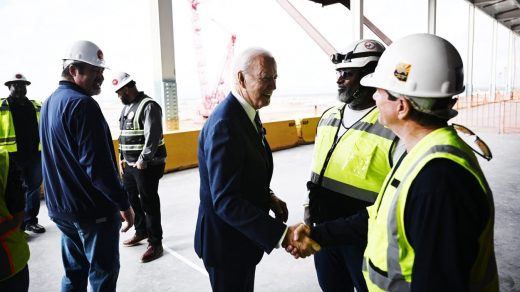TSMC’s new Arizona factory signals an increasingly divided world
By Wilfred Chan
The Taiwan Semiconductor Manufacturing Company (TSMC) is doubling down on its relationship with the U.S. At a ceremony in Arizona with President Joe Biden on Tuesday, executives from TSMC—which remains unmatched in its ability to produce the bleeding-edge chips demanded by firms from Apple to Toyota to Lockheed Martin—announced a second massive fabrication plant in the state, bringing its total investment to $40 billion.
The TSMC brass were joined by the CEOs of Apple, Nvidia, and AMD, all of whom pledged business to the facilities, where the total annual output is expected to reach 600,000 wafers per year. (Wafers are thin slices of silicon that each yield hundreds of chips.)
The new plants should help ease some of TSMC’s production strain under the ongoing chip shortage. But the announcement also reflected an uneasy decision by the Taiwanese firm as Biden administration policies ramp up pressure on chipmakers to choose the U.S. over China. And that could signal more global conflict over chips in coming years.
“TSMC is actually the company that makes something both (the U.S. and China) want, and has operations on both sides,” says Jason Hsu, a former Taiwan legislator who is now researching the geopolitics of semiconductor policy at Harvard. For decades, the company has charted a delicate balance between the two superpowers—but as the firm gets yanked harder toward the U.S., “I now think we are headed toward a collision course,” he says.
TSMC executives have made no secret of their reluctance to ramp up operations in the U.S. In April, the foundry’s retired but influential 91-year-old founder Morris Chang dismissed the idea of expanding its factory footprint on American shores as “a very expensive exercise in futility,” citing the U.S.’s high labor costs and “lack of manufacturing talent.” But new political developments may have changed his view. In October, the Biden administration ordered sweeping export controls that aim to cut off Chinese firms from chips made with U.S. technology that could power advanced weaponry, citing U.S. national security interests. TSMC, which also has factories in China, received a one-year exemption from the rule, “but I foresee that after one year they will be asked to join the sanctions,” Hsu says. The firm is opening new U.S. plants “mainly because they have to hedge against China.”
As part of the announcement, TSMC revealed that it had bought enough land in Arizona for six fabrication plants—a clear sign its U.S. expansion will continue. Chang didn’t mention his concerns about American manufacturing ability when he spoke at the ceremony on Tuesday, saying he had always dreamed of opening a plant in the United States. But he included a new and ominous warning: “Globalization is almost dead and free trade is almost dead. A lot of people still wish they would come back, but I don’t think they will be back.”
Hsu says TSMC’s shift to Arizona is an acknowledgement that the world is heading toward a “two chips system”: the United States and its allies using chips made by TSMC, and the rest of the world using chips from Chinese foundries like Shanghai’s SMIC. Under what Hsu calls a “Cold War 2.0” mindset, the U.S. is “turning semiconductors into a weapon, like nuclear warheads, as a way to deter China,” he says. That’s why Hsu suspects that the chips being made at the Arizona plant won’t just go to consumer tech firms, but the U.S. defense industry. “We’re probably looking at the U.S. preparing to stockpile some of the high end chips. God forbid, if there’s some kind of conflict with China, they’ll want a foundry to be as close to U.S. soil as possible.”
That doesn’t bode well for Taiwan, a country that China claims as a breakaway province and has repeatedly threatened to invade. For the last 40 years, Chinese demand for Taiwanese chips made them a kind of “silicon shield” that helped protect Taiwan, but a China deprived of TSMC might lash out unpredictably at the smaller nation, Hsu says. The hope is that TSMC can pivot away from China gracefully — but that’s a tightrope walk that makes chipmaking look easy. At best, “the process will be long and painful.”
(15)



